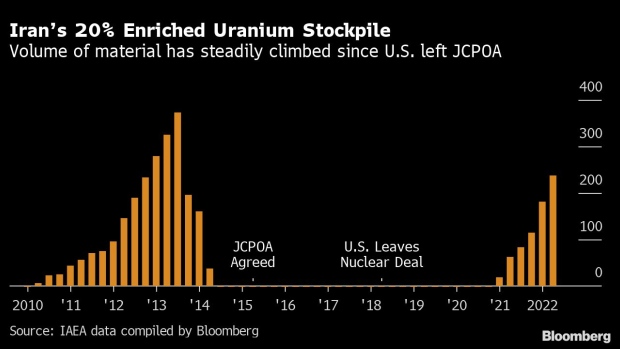Aug 15, 2022
Iran Vows to Give Its Response on Nuclear Deal Text on Monday
, Bloomberg News

(Bloomberg) --
The European Union views Iran’s response to a proposed blueprint for reviving the 2015 nuclear deal as constructive, according to an official familiar with the diplomatic efforts, and is consulting with the US on a “way ahead” for the protracted talks.
The positive comments are the first sign that the Iranian position, formally submitted by Tehran to the EU on Monday night, might not further stall the negotiations.
The official, who didn’t want to be named because of the sensitivity of the matter, said Iran’s response still required study and that other parties to the nuclear talks -- which include the US, China and Russia -- are assessing it.
EU mediators had circulated a “final” proposal for salvaging the landmark atomic deal last week. The bloc described that text as the last remaining hope of rescuing an accord that’s meant to limit Tehran’s nuclear activity in exchange for the lifting of sanctions, including on its energy sector. But comments from top Iranian officials suggested they were seeking further changes.
Extra oil from Iran could provide much-needed relief for a global economy hit by soaring energy costs. Brent oil futures fell as much as 2.8% in London to trade at a six-month low on Tuesday as traders weighed the more productive tone of the Iran talks.
The Sticky Issues Holding Up a New Iran Nuclear Deal: QuickTake
“We have received the Iranian response last evening. We are studying it and are consulting with the other JCPOA participants and the US on the way ahead,” the EU spokeswoman for Foreign Affairs and Security, Nabila Massrali, said earlier on Tuesday, using the nuclear deal’s formal acronym.
At a regularly scheduled briefing, she declined to speculate on the timing of any next steps.
The accord unraveled after the Trump administration abandoned it in 2018, setting off a security crisis in the Persian Gulf and effectively banning Iranian oil from global markets. Tehran retaliated by stepping up its uranium enrichment to near levels that are required for a weapons program.
Without Nuclear Deal, How Close Is Iran to a Bomb?: QuickTake
Talking to reporters on Tuesday, government spokesman Ali Bahadori Jahromi declined to describe the contents of Iran’s response to the EU. An adviser to Iran’s nuclear negotiating team, however, said Tehran wanted to safeguard any agreement by ensuring the US would “pay a price” if it again withdrew.
“This is the best way to protect a potential deal,” Mohammad Marandi, an academic who was part of Iran’s delegation to nuclear talks in Vienna earlier this year, said in a tweet.
In a separate message, Marandi suggested that this could mean Iran having a route to rapidly restoring an expanded enrichment program in the event any future US administration walks away.
Negotiations with world powers have dragged on for almost 18 months, dogged at various stages by political squabbles that have also involved terrorism sanctions, Russia’s war on Ukraine and inspections by the International Atomic Energy Agency.
On Monday, Iranian Foreign Minister Hossein Amirabdollahian called on the US to show “a realistic approach and flexibility” to conclude a deal.
“We’ve clearly told the US we’re ready to enter the phase of announcing the deal, and have a meeting of foreign ministers in Vienna on final conclusions, if our latest points are met,” he told reporters in Tehran.
State Department spokesman Ned Price said the Biden administration would share its views privately with the EU.
“We do agree, however, with his fundamental point -- and that is that what could be negotiated has been negotiated,” he said.
(Updates with comments from adviser to Iran’s nuclear negotiating team in ninth paragraph.)
©2022 Bloomberg L.P.






